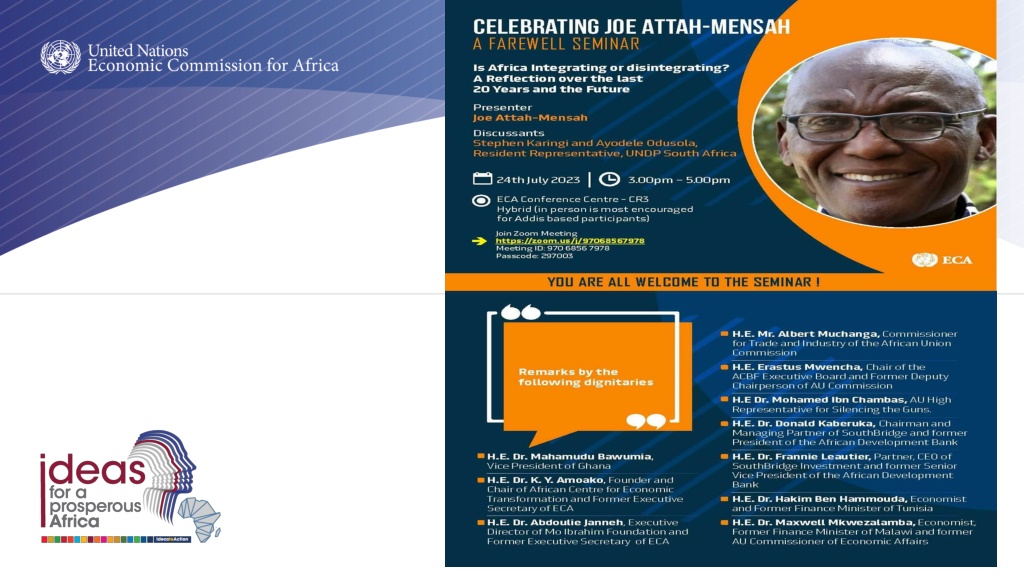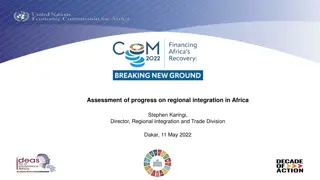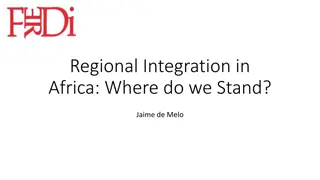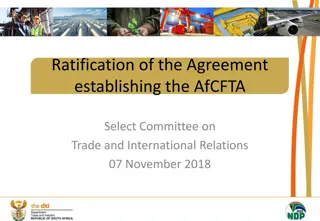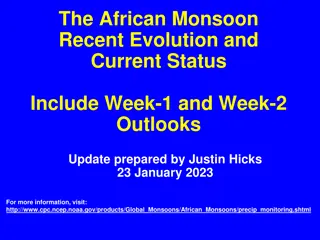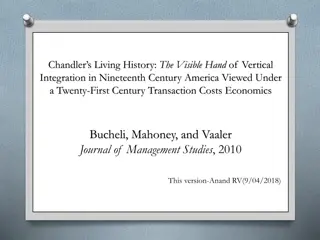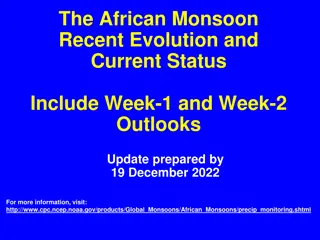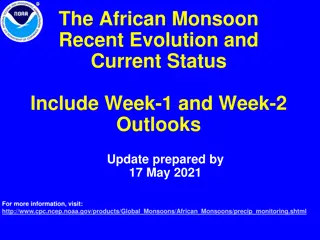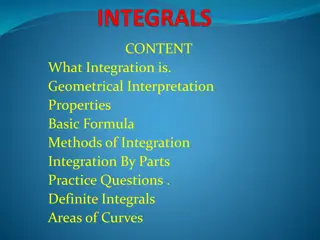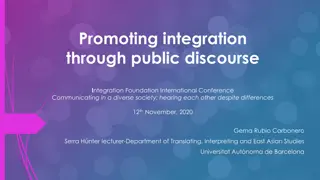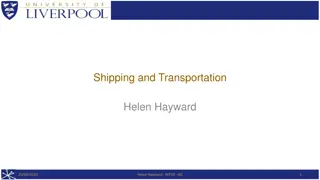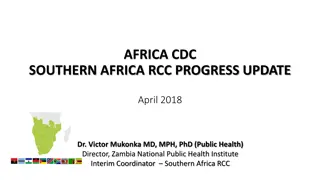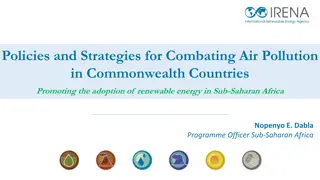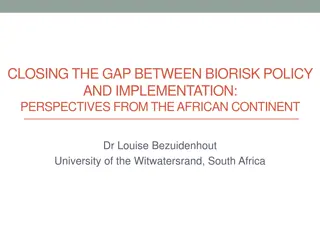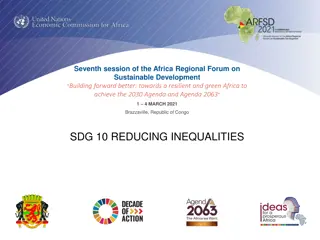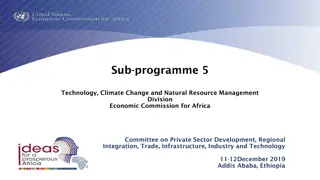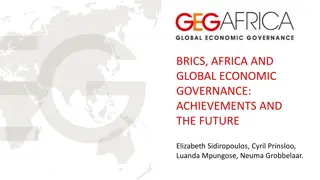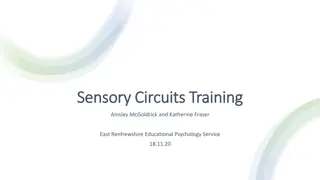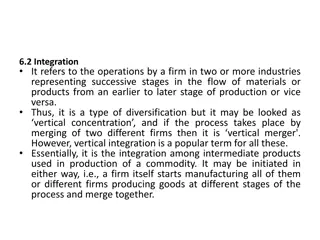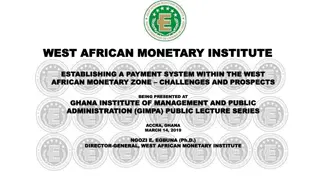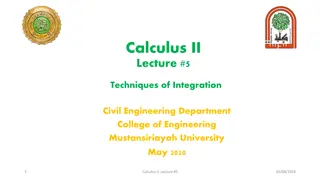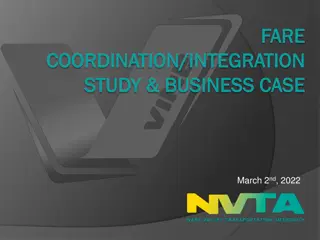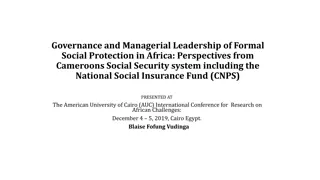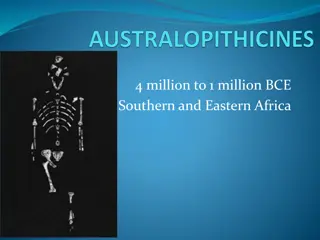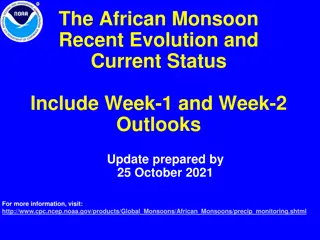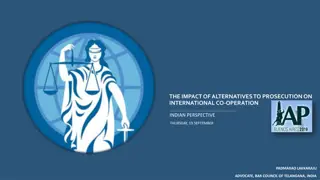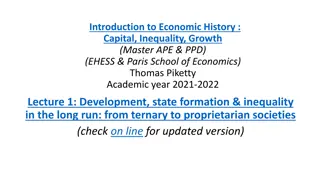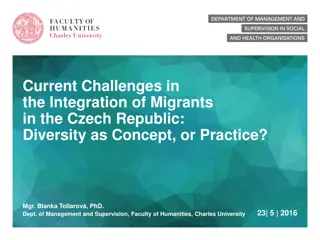Evolution of Integration in Africa - A Historical Perspective
President Kwame Nkrumah of Ghana played a pivotal role in advocating for the unification of Africa during its independence era. The continent faced challenges during the Cold War era, leading to the formation of different blocs with varying ideologies. The Organization of African Unity (OAU) sought to bridge the divisions and focus on liberation struggles. Over the years, regional integration efforts have been key for economic transformation on the continent, culminating in the establishment of the African Union. The vision is to consolidate fragmented economies into a strong, resilient, and diversified economy with essential infrastructure, skilled labor force, financial mobility, healthcare, and peace.
Uploaded on Sep 22, 2024 | 0 Views
Download Presentation

Please find below an Image/Link to download the presentation.
The content on the website is provided AS IS for your information and personal use only. It may not be sold, licensed, or shared on other websites without obtaining consent from the author. Download presentation by click this link. If you encounter any issues during the download, it is possible that the publisher has removed the file from their server.
E N D
Presentation Transcript
Evolution of Integration in Africa President Kwame Nkrumah of Ghana indicated at the time of Ghana s independence that the independence of Ghana was meaningless unless it was linked to the total liberation and unification of the entire continent The politics of the ColdWar in the early 1960s had a significant bearing on Africa s integration agenda, by dividing the continent into two camps: the CasablancaBloc and the Monrovia Bloc. The Casablanca bloc was more sympathetic to the Eastern ideology and wished for a faster pace at unifying the continent. 1
Evolution of Integration in Africa II Monrovia bloc espoused the ideas of the West and advocated for independence within existing boundaries. In a bid to prevent the division of the continent, African leaders formed the Organization of African Unity (OAU) as a compromise of the ideals of the two blocs. Nkrumah suggested in 1963 that Africa must unite must unite or perish. Others preferred a gradual approach The focus of OAU was to wage liberation struggle to rid the continent of the colonialism. Set up a liberation office in Tanzania which was disbanded in 1994 when apartheid regime in South Africa fell 2
Evolution of Integration in Africa III Regional integration has been part of Africa s strategy for economic transformation for more than three decades and in some cases for almost a century. Southern African Customs Union (SACU), began in 1910 The Southern Rhodesia Customs Union emerged in 1949 between South Africa and present-day Zimbabwe The Ghana Upper Volta Trade Agreement between Ghana and Upper Volta (now Burkina Faso) started in 1962 ECA has been central in supporting OAU/AU with its integration agenda. It was ECA conference of Finance Ministers in 1963 in Khartoum Sudan that gave birth to AfDB and the RECs 3
Roadmap on the creation of the African Union Sirte (9.9.99): OAU Special Summit Sirte Declaration Tripoli (June 2000): Ministerial Conference on Establishment of the AU 36th OAU Summit (Lom ,11 July 2000): Adoption of the Constitutive Act establishing the AU. 37th OAU Summit (Lusaka, July 2001): Adoption of NEPAD 38th and last OAU Summit and first Summit of the AU (Durban, July 2002) 4
The Imperatives for Regional Integration. What many Africans aspire for is that the 55 fragmented economies on the continent become integrated into one strong, robust, diversified and resilient economy, supported by: A first-class trans-boundary infrastructure; Highly educated, flexible and mobile workforce; Financial capital that is highly mobile; Sound health facilities; and Peace and security. 5
Continental Integration Agenda Lagos Plan of Action 1980 Abuja Treaty (1991) Sirte Declaration (1999) Constitutive Act establishing AU Union Government Debate Agenda 2063 6
Progress Report on Integration in Africa Programme for Infrastructure Development in Africa (PIDA): the construction of16,066km of roads and 4,077km of railways throughout the continent; the development of 3,506km of transmission line capacity and 700MW of new power generation; the connection of 17 countries with regional fibre optic cables. Reliable and affordable electricity: It is very important that countries address persistently high energy costs, lack of access to electricity and the unreliability of electricity supply, which together raise the cost of production and reduce the competitiveness of trade. 7
Progress Report on Integration in Africa II African Integrated High-Speed Railway Network (AIHSRN): Implementation of the 13 pilot railway links that were adopted as part of the project Master Plan. A Detailed Scoping Study (DSS) of the AIHSRN Project has been completed and adopted by STC-TTIIET in 2021. Single African Air Transport Market (SAATM): Achievements so far include the support to member States in the domestication and implementation of the SAATM policy, legal and regulatory instruments, and support to improve the level of Effective Implementation (EI) of ICAO Standards and Recommended Practices (SARPs) by States. Free Movement of Persons: Although the Protocol has been signed by a number of member States, to date only 4 member States, Rwanda, Niger, Mali, and Sao Tome and Principe, have ratified. Nevertheless, some member States have made progress in easing travel restrictions by facilitating visa-free for Africans traveling within in Africa, by issuing visa on arrival. 8
Progress Report on Integration in Africa III African Continental Free Trade Area (AfCFTA): 54 signatures and 47 ratifications. Progress has been recorded in the submission of tariff offers in Trade in goods. The total number of tariff offers for services offers is now 23. AfCFTA Secretariat has launched a Guided Trade Initiative with Cameroon, Egypt, Ghana, Kenya, Mauritius, Rwanda, and Tanzania, representing the five regions of Africa, trading under the initiative. 9
Progress Report on Integration in Africa IV African Continental Free Trade Area (AfCFTA) : African Export-Import Bank (Afrexim) launched the Pan-African Payments and Settlement System (PAPSS) to support the operationalization of the AfCFTA The Afreximbank has also established Adjustment Fund with a capital of one billion dollars to enable all States Parties to benefit from the AFCFTA. 10
Threats to Africas Regional Integration Tell no lies. Expose lies whenever they are told. Mask no difficulties, mistakes, failures. Claim no easy victories . . Amilcar Cabral EPAs and other bilateral trading Agreements Financing of the Union Not meeting Johannesburg targets Low implementation of the 0.2 levy Between 2015 to 2021 IP contributions ranged from 60 per cent to around 80 percent Lack of Political Will Fear of loss of sovereignty Lack of a compensation mechanism Weak infrastructure Poor macroeconomic environment -- Low economic growth and Debt Is review of the Global financial Architecture the panacea? 11
Recommendations to Accelerate Integration We must become bigger than we have been: more courageous, greater in spirit, larger in outlook. -- Emperor Haile Selessie 1. Use the Air Bus Model to build an African Regional Value Chains Development: Based on comparative advantagesAfrica may consider using this model to develop its regional value chain. 2. Strengthen supply chain infrastructure to support the AfCFTA: Without an efficient supply chain infrastructure the full gains of the AfCFTA would not be realised. Supply chain infrastructure involves transportation, communication, utilities, and technology. Security, risk, legal, contracts, insurance, customs, and payment are integral part of the chain. Investments in supply chains for intra- and inter-African countries are needed support the implementation of the AfCFTA. 3. Abolish visas for Africans travelling in Africa. Visa on arrival to Africans traveling in Africa is not enough. Need for sharing of intelligence so that Africans who are security- risk are stopped at the airports. AU needs to revamp its programme on the AU passport encouraging member States to follow the RECs in issuing national passports with AU and country s name on the passport similar to ECOWAS passport. 12
Recommendations to Accelerate Integration II 4. Need for Member States to ratify the Protocol to the Treaty Establishing the African Economic Community Relating to Free Movement of Persons, Right of Residence and Right of Establishment There is a link between free movement of persons and economic growth. Free movement of persons also contributes to the creation of a common market. To accelerate the ratification of the protocol, the AU should appoint a champion, perhaps a head of State, for the ratification of the Protocol, who could urge his/her colleagues to ratify the Protocol. 5. Strengthening the financing of the African Union: There is a need for member States to strengthen of the AU Commission and its organs as well as the RECs, both financial and human capacities, so that they would be effective in the implementation of agreed regional activities. 6. More Investments in Infrastructure needed: The acceleration of physical integration of the continent by the strengthening and improving of infrastructure on the continent. 13
Recommendations to Accelerate Integration III 7. Africa should have a common currency: A common currency for Africa is that it facilitates trade (in both goods and services) and investment among the countries Africa by reducing transaction costs in cross-border business and removing volatility in exchange rates across Africa. The challenges that will be faced along the path leading to the creation of an African single currency should strengthen our resolve and to adopt measures to mitigate the challenges so that the current multiple currencies on the continent are replaced by one single currency. Accelerate the creation of the AU Financial institutions 8. Enhanced engagement of the Private Sector and CSOs: The active involvement of the private sector and the civil society organizations in regional integration programmes. It is through the participation of these two groups that regional integration would be felt at the national level. 14
Recommendations to Accelerate Integration III 9. Non-Africans need to stop calling parts ofAfrica sub-saharaAfrica: . Africa south of the Sahara is a definition aimed at separating Africa from its northern territories. The Sahara must be a bridge to unite us, not an obstacle to divide us -- King Idris I of Libya 15
Ethiopia shall rise Ethiopia, Africa s bright gem Set high among the verdant hills That gave birth to the unfailing Waters of the Nile Ethiopia shall rise Ethiopia, land of the wise; Ethiopia, bold cradle of Africa s ancient rule And fertile school Of our African culture; Ethiopia, the wise Shall rise And remold with us the full figure Of Africa s hopes And destiny. Kwame Nkrumah 25 May 1963 16
Let us all agree to die a little, or even completely so that African unity may not be a vain word Ahmed Ben Bella Africa must Unite to achieve the Africa that We Want 17
